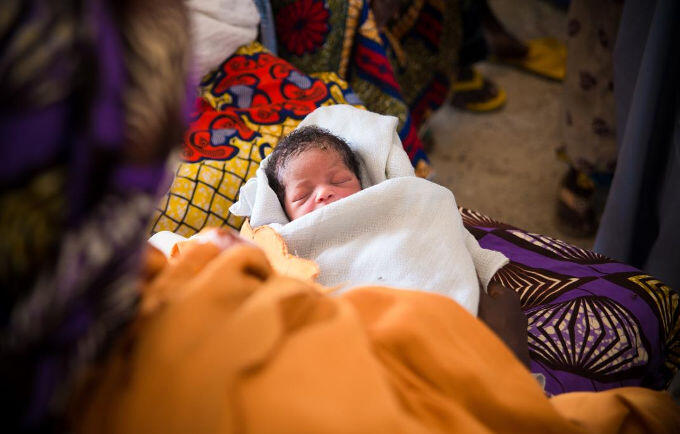JANUARY: Scale-up of Humanitarian intervention in Nigeria’s North East
In 2015, UNFPA further scaled up its humanitarian response in the North East, targeting 4.5million beneficiaries of the 14.8million people affected by insurgency in the region. The scale up was necessary because in 2014, the humanitarian crisis in the North East escalated with an upsurge of violence against civilians, the mass abductions of women and children, the destruction of communities and means of livelihoods.
APRIL: Response To The “Rescued Girls”
The Boko Haram conflict in the North East is the biggest human security threat in the country. In April, remarkable progress was made as the Government of Nigeria took over territories that were once strongholds of the Boko Haram Group. One of such territories was the Sambisa Forest in Borno State. The victory led to the rescue of hundreds of women and children held captive. Upon their release, UNFPA responded immediately to the psychosocial and reproductive and sexual health needs of the vulnerable women and girls.
MAY: Nigeria Takes A Stand Against Sexual And Gender Based Violence
UNFPA, through its targeted interventions and years of advocacy with other partners, successfully witnessed Nigeria pass into law, its first “Violence against person’s prohibition” bill (VAPP). The VAPP law provides a legislative and legal framework for the prevention of all forms of violence against vulnerable persons, especially women and girls. UNFPA provided technical and financial support to LACVAW (Legislative advocacy coalition on violence against women), a coalition that worked on and pushed for the passing of the VAPP bill.
JUNE: 5,622 Fistula repairs
We met Zainab Baubau a 32 year old fistula patient twenty years after her failed marriage to Mohammed and 19 years after the death of her son, an infant she lost during childbirth. At the age of 12, she developed obstetric fistula and has lived with it for many years until today. Zainab Baubau is one of the 5,622[ Fistula repairs from 2009 - 2015] beneficiaries of the UNFPA supported free surgical repaired cases a beneficiary of the economic empowerment and social re-integration programme.
JULY: Donation of Training Arm Models Worth $1 Million
UNFPA partnered with a private company called Merck Sharp and Dohme to receive and donate training arm models worth $1 million to the Nursing and Midwifery Council of Nigeria (NMWCN). The donation which was presented to NMCM through the global ambassador for midwives, Mrs. Toyin Saraki, will help Nigerian Midwives to competently administer long acting and reversible contraceptives (LARC) to women of reproductive age in the country.
AUGUST: The United Nations Secretary General, Mr. Ban Ki-Moon visits Nigeria
The United Nations Secretary General, Mr. Ban Ki-moon during his visit to Nigeria reiterated the United Nation’s commitment to adolescent reproductive health. He said “the United Nations is committed to ensuring that every girl, regardless of her age, culture or background has access to equitable and quality education and importantly expresses her right to be a girl.
SEPTEMBER: Office Of The Wife Of The President Seeks To Improve The Health Of Women And Children, Including Adolescent Girls In Nigeria
Her Excellency (H.E), Mrs. Aisha Muhammadu Buhari (represented by H.E Dolapo Osibanjo, wife of the Vice president) articulated her vision to complement the efforts of the Government of Nigeria to reduce the rate of maternal and child mortality in the Country. She made this presentation at a side event organized by the Office of the Wife of the President on the side lines of the 70th United Nations Gerneral Assembly in New York. The event was funded by the United Nations Population Fund (UNFPA).
NOVEMBER: Launch of the Adolescent Girl Initiative in Norther Nigeria
The Adolescent Girls Initiative in Northern Nigeria, is a UNFPA-supported programme that teaches vulnerable girls about their rights, their bodies and health. The goal of the Initiative is to improve the social, economic and health wellbeing of rural and low-income urban adolescent girls and secure their future through increased access to education, reproductive health information/services and life-skills that will positively impact on health choices. The pilot programme in Kaduna State began in September 2014, and currently reaches 400 girls. In 2016, it will be expanded to cover two more states – Kebbi and Sokoto – with plans to reach 131,000 girls.
DECEMBER: HIV Dance Concert
A Dance Concert was organized to commemorate the 2015 World AIDS Day. The concert provided a creative and entertaining platform to educate young people on HIV/AIDS. “Zero is the Goal” was the theme of the event, to promote the campaign on Zero new HIV infections, Zero discrimination and Zero AIDS deaths in Nigeria.
DECEMBER: National Family Planning Conference convened
A 2 day national consultative conference on family planning programming in Nigeria was held in December. The conference was hosted by the Nigeria Federal Ministry of Health (FMOH) in partnership with the United Nations Population Fund (UNFPA), to review the family planning outlook in Nigeria, and to develop strategies to meet the targeted 36% Contraceptive Prevalence Rate set by the FMOH, by 2018.


